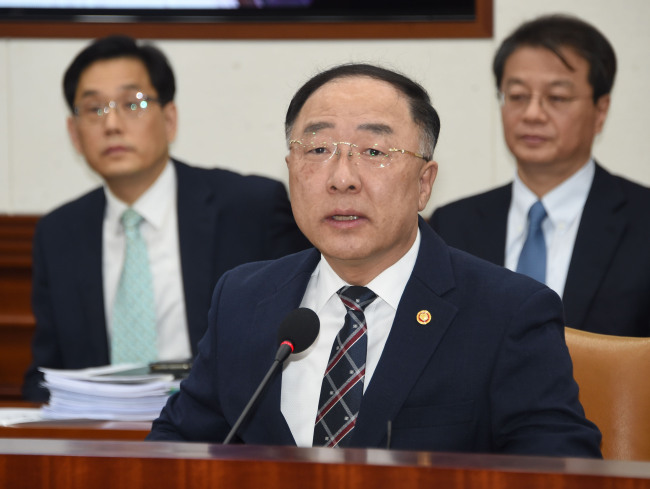Deputy PM urges swift passage of extra budget amid growing downside risks
Fiscal chief puts pressure on opposition to end protest, cooperate in approving extra budget
By Bae HyunjungPublished : May 8, 2019 - 17:08
South Korea’s top fiscal chief Wednesday urged the National Assembly to pass the government’s 6.7 trillion won ($5.7 billion) supplementary budget, citing the growing downside risks weighing on the economy.
His remark came amid a weeks-long paralysis of the assembly’s legislative functions as the conservative main opposition party embarked on a nationwide protest against a set of fast-track reform bills.
His remark came amid a weeks-long paralysis of the assembly’s legislative functions as the conservative main opposition party embarked on a nationwide protest against a set of fast-track reform bills.

“The supplementary budget bill is all about timing and speed,” said Deputy Prime Minister and Finance Minister Hong Nam-ki in a meeting on economic revitalization held at Seoul Government Complex.
“The downside risks (for the Korean economy) have expanded recently due to aggravating global economic factors.”
Hong demanded that the parliament pass the pending budget bill, along with other economic bills related to people’s livelihood such as the Minimum Wage Act and Labor Standards Act.
Late last month, the government proposed a supplementary budget to respond to the slowing economy and fine dust pollution, marking the third of its kind under the incumbent Moon Jae-in administration.
The 6.7 trillion won fiscal injection is expected to boost the country’s economic growth by 0.1 percentage point this year, according to Hong.
While the Ministry of Economy and Finance is projecting the nation’s growth rate at 2.6-2.7 percent for this year, the Bank of Korea last month cut down its outlook to 2.5 percent from the previous 2.6 percent, citing the slowing pace in exports and facility investments.
But the budget plan is up in the air due to the Liberty Korea Party’s legislative boycott over the disputed fast-tracked bills, which it defines as “leftist dictatorship.”
Backing the fiscal policymaker’s growing concerns over the economy was the slowing pace of exports.
Preliminary data released Wednesday by the BOK showed that the country’s current account surplus in March, though in the black for 83 consecutive months, contracted $5.1 billion from a year earlier to $4.8 billion.
Also, the corresponding figure for January-March stood at $11.2 billion, marking the lowest quarterly figure since the second quarter of 2012.
The slowing pace was largely attributable to the slowing demand for semiconductors and petrochemical goods which pulled down the goods account surplus in the first quarter to $19.6 billion, the lowest in 20 quarters, the central bank said.
“Over the past two years, the government has made efforts to transform into an innovative and inclusive state that can respond to slow growth and polarization,” Hong said, pointing out that the day marks the second anniversary of the Moon administration.
“Due to structural changes in the economy, however, challenges such as sluggish investments and unbalanced distribution continue to persist.”
By Bae Hyun-jung (tellme@heraldcorp.com)






![[KH Explains] How should Korea adjust its trade defenses against Chinese EVs?](http://res.heraldm.com/phpwas/restmb_idxmake.php?idx=644&simg=/content/image/2024/04/15/20240415050562_0.jpg&u=20240415144419)











![[Today’s K-pop] Stray Kids to return soon: report](http://res.heraldm.com/phpwas/restmb_idxmake.php?idx=642&simg=/content/image/2024/04/16/20240416050713_0.jpg&u=)